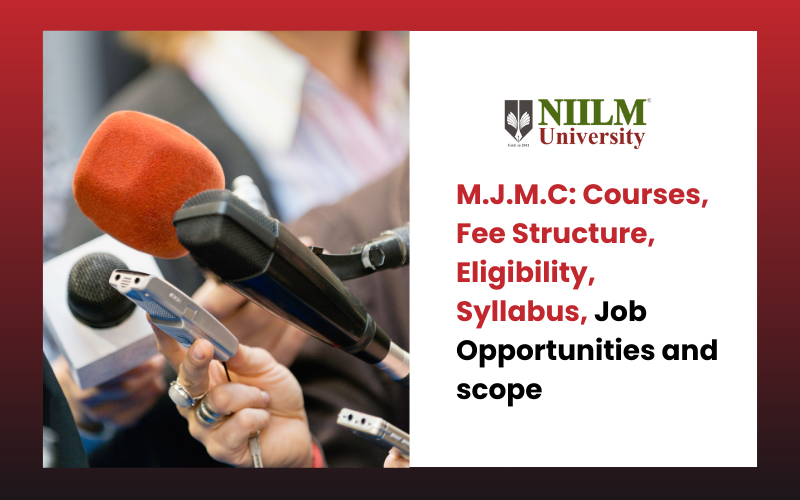Admission Enquiry

Learn about MJMC's courses, costs, admission requirements, curriculum, employment opportunities, and breadth. Examine every aspect of your media career path.
The field of journalism and mass communication is an effective tool that shapes attitudes, spreads information, and influences cultures globally in the fast-paced digital age we live in. The Master of Journalism and Mass Communication (MJMC) stands out among the many academic options as a suitable program for individuals hoping to build a name for themselves in the ever-changing media and communication scene.
What is MJMC Degree?
The Master of Journalism and Mass Communication program, or MJMC for short, is a postgraduate course of study that gives students the broad knowledge, practical abilities, and insightful understanding they need to succeed in the media and communication industries. It explores multiple aspects of public relations, advertising, broadcasting, journalism, and new media technologies.
Why should you choose MJMC Degree?
Selecting MJMC gives you access to a wide range of options in the dynamic media sector. It provides an opportunity for developing one's critical thinking, communication, and storytelling skills. In addition, the curriculum develops the analytical abilities, creativity, and moral principles necessary for negotiating the complexity of today's media environments.
Eligibility Criteria in MJMC
Academic Qualifications
Typically, candidates must have a bachelor's degree in any area from an accredited university in order to be admitted to MJMC programs. However, depending on the institution, certain eligibility requirements could change.
Entrance Exams
A few institutions and universities offer entrance tests to candidates in order to evaluate their ability and skills. Written exams, group discussions, and in-person interviews are all possible components of these exams.
Fee Structure for MJMC Programs
The expense of MJMC programs fluctuates from school to school and may be influenced by things like teacher experience, infrastructure, and the college's reputation. However, eligible students frequently have access to financial aid opportunities such as scholarships.
Courses in MJMC
Master of Journalism and Mass Communication is what MJMC stands for. This postgraduate program's main goal is to give students advanced knowledge and abilities in mass communication and journalism. A description of the common courses offered in a MJMC program is shown below:
Media and Communication Theories: The mathematical basis of media and communication are examined in this course, which covers ideas including framing, agenda-setting, media effects, and cultivation theory.
Media Research Methods: Students gain knowledge of a variety of research techniques utilized in media studies, such as content analysis, surveys, interviews, and both quantitative and qualitative approaches.
Journalism Ethics and Law:This course examines the legal requirements and ethical guidelines that control the practice of journalism, including topics like media accountability, defamation, privacy, and freedom of speech.
News Reporting and Writing: The foundations of journalistic writing are taught to students, including how to acquire news, conduct interviews, organize stories, and write for print, web, and broadcast media.
Broadcast Journalism: The creation and delivery of news and information for radio and television, including voice modulation, editing, scripting, and presenting techniques, are the main topics of this course.
Digital Media and Social Media: This course examines how social media platforms and digital technology have affected journalism and communication techniques. It covers subjects like digital storytelling, social media management, and online journalism.
Advertising and Public Relations: Students learn about the principles and practices of advertising and public relations, including campaign planning, media buying, branding strategies, and crisis communication.
Media Management and Entrepreneurship: This course focuses on the business side of media organizations, covering topics such as media economics, management principles, audience analysis, and media entrepreneurship.
Documentary Filmmaking: Students gain knowledge of the research, narration, cinematography, editing, and other aspects of the art and skill of documentarian filmmaking.
Specialized Electives: A variety of elective courses covering specific subjects like sports journalism, environmental journalism, health communication, photojournalism, and cultural studies are frequently offered by MJMC programs.
Job Opportunities in Journalism and Mass Communication
Print Media
Graduates of MJMC programs can work for publishing houses, newspapers, and magazines in the following capacities:
Reporters
Editors
Feature Writers
Photojournalists
Electronic Media
Opportunities in electronic media include roles such as:
News Anchors
Broadcast Journalists
Video Editors
Scriptwriters
Digital Media
With the rise of digital platforms, there is a growing demand for professionals in:
Online Journalism
Social Media Management
Content Creation
Search Engine Optimization (SEO)
Scope and Future Prospects
The media and journalism industries are expanding quickly, providing a wide range of job options and potential for advancement. Professionals in this industry are in high demand across businesses like media, advertising, public relations, and corporate communications due to the introduction of new technology and digital platforms.
Conclusion
Students enrolled in MJMC programs graduate with the information, abilities, and real-world experience necessary to succeed in the fast-paced fields of mass communication and journalism. Graduates of MJMC programs are well-positioned to make a significant influence in the communication industry, whether they want to pursue a career in traditional media or investigate new prospects in digital platforms.
Frequently Asked Questions (FAQs)
Q1. Is MJMC a good career option?
A1. Yes, MJMC offers excellent career prospects in journalism, media production, advertising, and public relations.
Q2. What are the job roles available after completing an MJMC program?
A2. Job roles include reporter, editor, news anchor, content creator, social media manager, and more.
Q3. Are there any entrance exams for MJMC courses?
A3. Some institutions conduct entrance exams to assess the aptitude and skills of applicants.
Q4. What is the duration of MJMC programs?
A4. Bachelor's programs typically last for three years, while master's programs are usually two years long.
Q5. Can I specialize in a specific area within MJMC?
A5. Yes, MJMC programs often offer elective courses and specialization options in areas such as advertising, public relations, digital journalism, and filmmaking.
Copyrights © 2024 NIILM UNIVERSITY. All rights reserved.